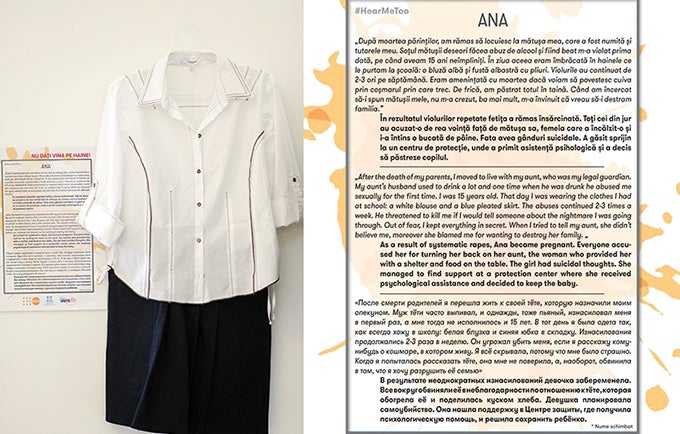CHIȘINĂU, Moldova — A school uniform. A pair of pyjamas. Work slacks and a blouse. These are just some of the clothes that women and girls in Moldova were wearing when they were sexually assaulted, abused or harassed. An exhibition of ten such outfits, accompanied by the stories of the survivors, aimed to combat stereotypes about sexual violence that are prevalent in Moldovan society.
“Unfortunately more than 40% of men in our country think if a woman has a ‘bad reputation’ or does not physically resist an assault, the case should not be considered rape,” said Natalia Valcu, executive director at the Women’s Law Centre, which sponsored the exhibit along with UNFPA. “The real stories presented in the exhibition break the stereotypes and show that it’s not about the clothes a woman wears, it’s about the attitude of the male assailant.”
Six out of 10 women over the age of 15 in the Republic of Moldova will experience at least one form of violence — psychological, physical or sexual — from their husband or partner during their lifetime. Sexual violence is the third most common form of violence experienced by young girls and leaves serious marks on their lives.
Iuliana’s story demonstrates those long-lasting negative effects. Abused and raped at the age of 15, she cut off her long hair, started to wear only men’s clothes and even now, a dozen years later, has difficulties in building relationships. “My boyfriend would like me to wear a dress, use makeup or do my hair, but I can’t do that because that would mean provoking men,” Iuliana said in her testimonial, featured in the exhibit. “I don’t want this. I will never be able to make myself beautiful.”
The exhibition, which was titled “Don’t blame the clothes!” and held at the Faculty of Law at Moldova State University in December, presented reconstructed outfits and testimonials from real women and girls who were assisted by the Women’s Law Centre, the Centre for Assistance and Protection of Victims of Violence and Human Trafficking, and the International Centre “La Strada”. The three organizations collaborated to put on the exhibition with the support of UNFPA and the Moldova State University Faculty of Law. The concept was drawn from the “What Were You Wearing?” Survivor Art Installation originated at the University of Arkansas in the United States in 2013.
“It’s a great initiative and it would be good to organize such events more often, at schools, universities and private companies,” said Alexandru Agrici, a 19-year-old student at the Faculty of Law who visited the exhibit. “Everything depends on how children are educated, because they see what happens around them and follow the same behaviour when they become adults.”
The organizers of the exhibition are working on a mobile version that can be set up at other educational institutions as well as brought to rural communities to generate discussion and break down stereotypes in order to combat sexual violence.
“Sexual violence can lead to unplanned pregnancies and births, sexually transmitted infections and psycho-emotional disorders for girls and women,” said Eugenia Berzan, programme analyst at UNFPA Moldova. “We appeal to all partners to support initiatives like these, which make the voices of the most vulnerable women and girls heard, and to reduce violence and violations of human rights to zero.”
The “Don’t blame the clothes!” exhibition was organized as part of the UN Secretary-General’s UNiTE to End Violence against Women global campaign and the annual 16 Days of Activism against Gender-Based Violence.
A version of this story originally appeared on the website of UNFPA Moldova.




